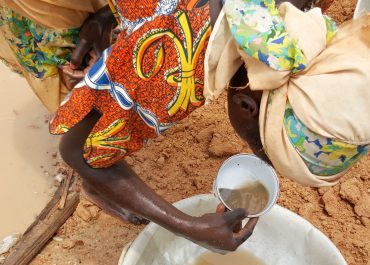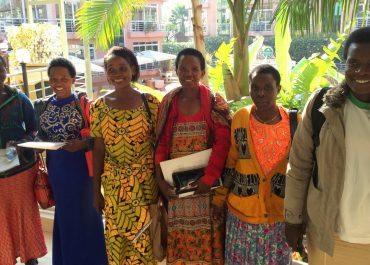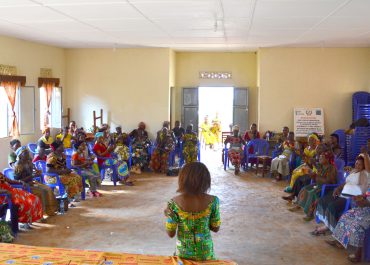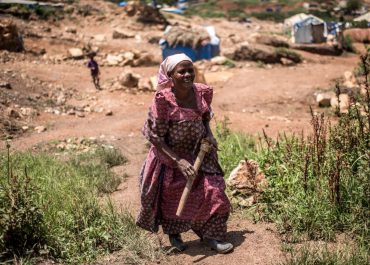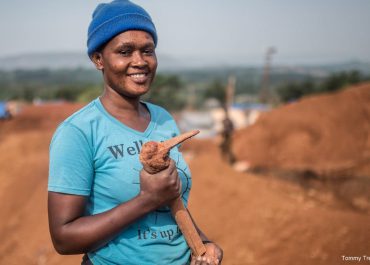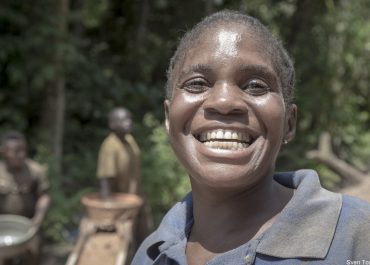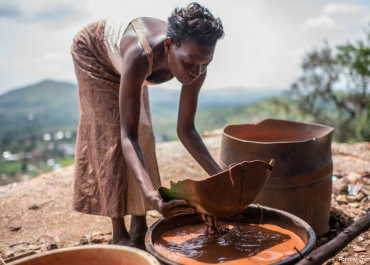Women in Artisanal & Small-Scale Mining in Central and East Africa
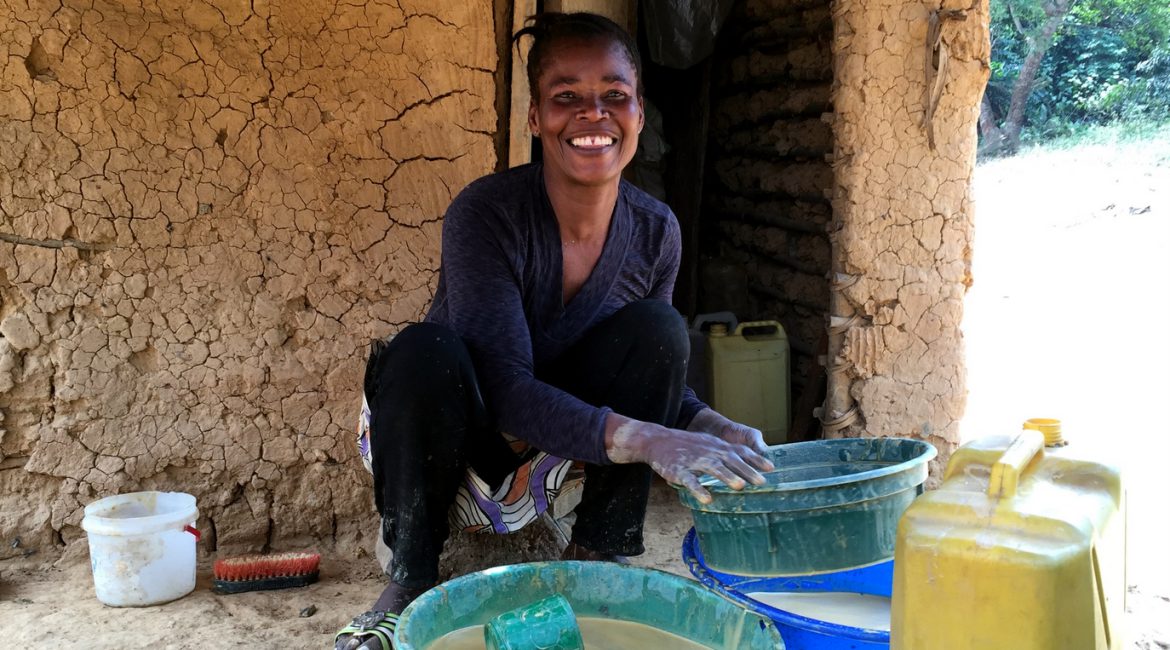
Women in Artisanal and Small-Scale Mining (ASM) in Central and East Africa is IMPACT’s ground-breaking research project studying the role of women in the artisanal mining sector and opportunities for their empowerment.
Women are an essential part of artisanal mining. They take on roles from panning and processing to trading goods and services. They rely on the income from this informal mining economy to support their households and dependents. But their diverse participation and challenges to be recognized as economic actors in the ASM sector are most often ignored.
Together with Canada’s Carleton University and Uganda’s Development Research and Social Policy Analysis Centre, we’re exploring women’s livelihoods in the artisanal mining of 3Ts (tin, tantalum, tungsten) and gold within the Democratic Republic of Congo, Rwanda, and Uganda.
Through surveys, focus groups, and interviews, our three-year research project studies dynamics in seven mine sites across the three countries. We aim to reveal how gender inequality limits women’s contributions to the ASM sector and their potential as economic and social actors within the sector.
We’re also examining how policies, regulations, and laws fail to acknowledge gender inequalities within mining communities and make women even more vulnerable. With the three countries at different stages of implementing reforms that target the integration of gender equality into artisanal mining, we’re able to undertake a comparison across the region.
As part of the research project, we’re developing recommendations—based on our key findings and validated by the research participants and artisanal mining communities themselves—for provincial, national, regional, and international policymakers to improve women’s opportunities in the ASM sector.
Funding
The Women in Artisanal and Small-Scale Mining in Central and East Africa project is part of the Growth and Economic Opportunities for Women (GrOW) program, which is jointly funded by the UK’s Department for International Development (DfID), the William and Flora Hewlett Foundation, and Canada’s International Development Research Centre (IDRC). Additional funding for the research is provided by Global Affairs Canada. Research began in 2015.
Recent Highlights
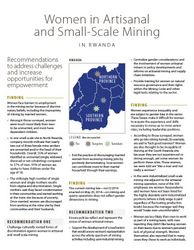
Women in ASM in Rwanda: Recommendations to address challenges
November 2017
This brief highlights key recommendations to address challenges women face in the artisanal mining sector in Rwanda and increase opportunities for their empowerment.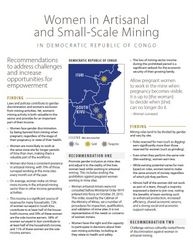
Women in ASM in DRC: Recommendations to address challenges
November 2017
This brief highlights key recommendations to address challenges women face in the artisanal mining sector in the Democratic Republic of Congo and increase opportunities for their empowerment.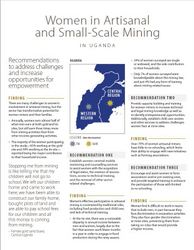
Women in ASM in Uganda: Recommendations to address challenges
November 2017
This brief highlights key recommendations to address challenges women face in the artisanal mining sector in Uganda and increase opportunities for their empowerment.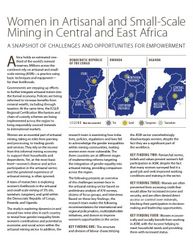
Women in Artisanal and Small-Scale Mining: A snapshot of central and east Africa
2017
This brief highlights key findings of research into women and artisanal mining in the Great Lakes region by Partnership Africa Canada, Carleton University, and Development Research and Policy Analysis Centre for the Growth and Economic Opportunities for Women (GrOW) program.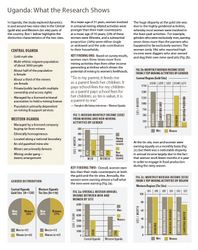
Women in Artisanal and Small-Scale Mining: Uganda
October 2017
This brief highlights key findings of research studying the role of women in the artisanal mining sector. It provides a snapshot of challenges and opportunities for women’s empowerment in artisanal mining in Uganda.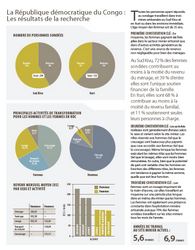
Women in Artisanal and Small-Scale Mining: Democratic Republic of Congo
July 2017
This brief highlights key findings of research studying the role of women in the artisanal mining sector. It provides a snapshot of challenges and opportunities for women’s empowerment in artisanal mining in the Democratic Republic of Congo. Only available in French.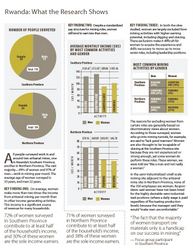
Women in Artisanal and Small-Scale Mining: Rwanda
July 2017
This brief highlights key findings of research studying the role of women in the artisanal mining sector. It provides a snapshot of challenges and opportunities for women’s empowerment in artisanal mining in Rwanda.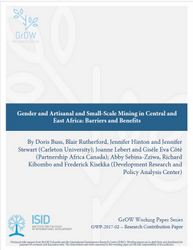
Gender and Artisanal and Small-Scale Mining in Central and East Africa: Barriers and Benefits
July 2017
This working paper presents key research findings on women in the artisanal mining sector in the Great Lakes region. It was developed by Partnership Africa Canada, Carleton University and Development Research and Social Policy Analysis Center (DRASPAC) as part of the GrOW program.Meet Josephine and Zawadi: Women Artisanal Miners in Democratic Republic of Congo
Meet Josephine Kibondo and Moza Zawadi, two women artisanal gold miners in Democratic Republic of Congo’s Ituri Province. They share their stories of their life as artisanal miners and, while they say it’s hard work, they rely on the income from artisanal mining to support their families. Women are an essential part of artisanal mining, taking on roles from panning and processing, to trading goods and services. But their diverse participation and the challenges they face in being recognized as economic actors in the sector are often ignored. Video by Sven Torfinn/IMPACT

